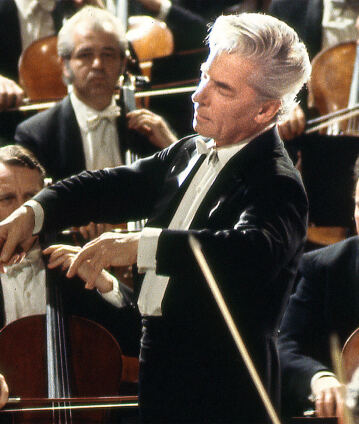Karajan conducts Beethoven’s Symphony No. 5

“Throw away your first hundred Fifths!” Karajan would tell younger conductors, such are the challenges of this Beethoven symphony. In this recording from 1972, we experience on the other hand a definitive interpretation. The orchestral sound combines the velvety opulence typical of his predecessors with the brilliance and power Karajan brought to the Berlin tradition.
No orchestra has been more closely associated with Beethoven’s Fifth Symphony on record and on film over the last 100 years than the Berliner Philharmoniker. Arthur Nikisch’s pioneering 1913 recording for the Gramophone Company and Wilhelm Furtwängler’s celebrated 1937 HMV recording were followed in the era of Herbert von Karajan by a series of films and recordings which were no less imposing.
Despite his claim about the “first 100 Fifths”, there is evidence that Karajan’s own early performances of the symphony were already remarkably assured. In September 1938, he included the work in what was only his second concert with the Berliner Philharmoniker. Leading Berlin critic Heinrich Strobel was struck by the rhythmic power of the performance and its structural logic. At his London début in April 1948, Karajan ended the concert with the Fifth. At the final rehearsal he simply asked the orchestra to let him hear how powerfully, consistent with beauty of tone, it could play the symphony’s final C major chords. All great Karajan performances had a destination towards which they moved.
Karajan’s first filmed performance of Beethoven’s Fifth, shot in black and white with the Berliner Philharmoniker in 1966, was part of the series The Art of Conducting which he made in collaboration with the French director Henri-Georges Clouzot. In later years Karajan was masterminding his own films in collaboration with his director of photography Ernst Wild. Based on a live concert performance given before an invited audience in the Berlin Philharmonie, this 1972 film of the Fifth Symphony shows the orchestra marrying a depth of tone Nikisch and Furtwängler would have recognised with a new-found brilliance of attack which Karajan’s Toscanini-inspired Beethoven readings had brought to the Berlin tradition.
© 1973 Unitel
Artists
Our recommendations
- Performance and conversation: Karajan conducts Dvořák’s Symphony No. 9
- Karajan conducts Brahms’s Symphonies Nos. 1–4
- Karajan conducts Beethoven’s Ninth Symphony at the 1977 New Year’s Eve Concert
- Herbert von Karajan and Mstislav Rostropovich with Strauss’s “Don Quixote”
- Karajan conducts Tchaikovsky’s Symphonies Nos. 4–6
- Karajan conducts Beethoven’s Ninth Symphony